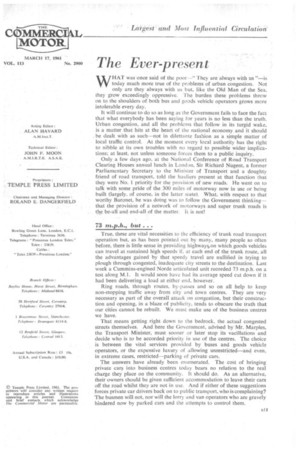The Ever-present
Page 45

If you've noticed an error in this article please click here to report it so we can fix it.
WHAT was once said of the poor—" They are always with us "—is today much more true of the problems of urban congestion. Not only are they always with us but, like the Old Man of the Sea, they grow exceedingly oppressive. The burden these problems throw on to the shoulders of both bus and goods vehicle operators grows more intolerable every day.
It will continue to do so as long as the Government fails to face the fact that what everybody has been saying for years is no less than the truth. Urban congestion, and all the problems that follow in its turgid wake, is a matter that hits at the heart of the national economy and it should be dealt with as such—not in dilettante fashion as a simple matter of local traffic control. At the moment every local authority has the right to nibble at its own troubles with no regard to possible wider implications; at least, not unless someone forces them to a public inquiry.
Only a few days ago, at the National Conference of Road Transport Clearing Houses'annual lunch in London, Sir Richard Nugent, a former Parliamentary Secretary to the Minister of Transport and a doughty friend of road transport, told the hauliers present at that function that they were No. 1 priority for the provision of new roads. He went on to talk with some .pride of the 300 miles of motorway now in use or being built (largely, of course, in the latter state). What, with respect to that worthy Baronet, he was doing was to follow the Government thinking— that the provision of a network of motorways and super trunk roads is the be-all'and end-all of the matter. It is not!
73 rrt.p•h., but • True, these are vital necessities to the efficiency of trunk road transport operation but, as has been pointed out by many, many people so often before, there is little sense in providing highway§,on which goods vehicles can travel at sustained high speeds if, at each end of the trunk route, all the advantages gained by that speedy travel are nullified in trying to plough through congested, inadequate city streets to the destination. Last week a Cummins-engiried Norde articulated unit recorded 73 m.p.h. on a test along M.1. It would soon have had its average speed cut down if it had been delivering a load at either end, however.
Ring roads, through routes, by-passes and so on all help to keep non-stopping traffic away from city and town centres. They are very necessary as part of the overall attack on congestion, but their construction and opening, in a blaze of publicity, tends to obscure the truth that our cities cannot be rebuilt. We must make use of the business centres we have.
That means getting right down to the bedrock, the actual congested streets themselves. And here the Government, advised by Mr. Marples, the Transport Minister, must sooner or later stop its vacillations and decide who is to be accorded priority in use of the centres. The choice is between the vital services provided by buses and goods vehicle operators, or the expensive luxury of allowing unrestricted—and even, in extreme cases, restricted—parking of private cars.
The answers have already been enumerated. The cost of bringing private cars into business centres today bears no relation to the real charge they place on the community. It should do. As an alternative, their owners should be given sufficient accommodation to leave their cars off the road whilst they are not in use. And if either of these suggestions forces private car drivers back on to public transport, who is complaining? The busmen will not, nor will the lorry and van operators who are gravely hindered now by parked cars and the attempts to control them.




































































































































